Home Tags Posts tagged with "ukraine"
ukraine
German Chancellor Angela Merkel and French President Francois Hollande have arrived in Ukraine’s capital Kiev to present a new peace initiative.
Secretary of State John Kerry, who is also in Kiev, said the US wanted a diplomatic solution, but would not close its eyes to Russian aggression.
Fighting between Ukrainian forces and pro-Russian rebels has killed more than 5,000 people since last April.
Ukraine and the West have accused Russia of arming rebels in eastern Ukraine and sending regular troops across the border.
Russia denies direct involvement but says some Russian volunteers are fighting alongside the rebels.
Speaking at a joint news conference with John Kerry, Ukrainian PM Arseniy Yatsenyuk said: “We need to get peace. But we will never consider anything that undermines territorial integrity… of Ukraine.”
John Kerry accused Russia of violating Ukraine’s sovereignty, saying that Russia had been acting with “impunity”, crossing the Ukrainian border “at will with weapons [and] personnel”.
“We are choosing a peaceful solution through diplomacy – but you cannot have a one-sided peace,” he said.
John Kerry added that President Barack Obama was still “reviewing all options”, including the possibility of providing “defensive weapons” to Ukraine, due to the dangerous escalation in violence.
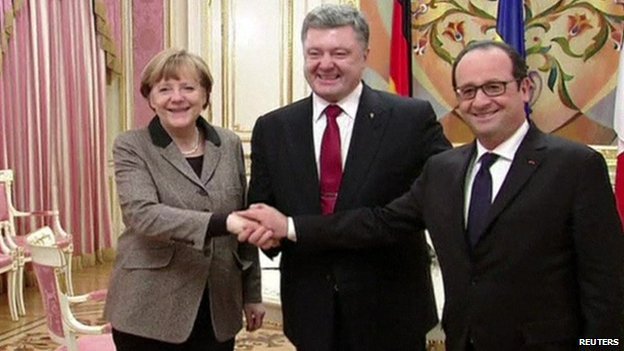
Photo Reuters
The US is currently only providing “non-lethal” assistance.
Russian Foreign Ministry spokesman Alexander Lukashevich said any decision by the US to supply weapons to Ukraine would “inflict colossal damage to Russian-American relations”.
Several senior Western officials have also expressed concern at the prospect of US arms being sent to Ukraine.
German Foreign Minister Frank-Walter Steinmeier likened the option to “throwing more weapons on the bonfire”, while NATO commander Philip Breedlove said governments must take into account that the move “could trigger a more strident reaction from Russia”.
Francois Hollande and Angela Merkel arrived in Kiev on February 5, in what appeared to be a speedily arranged visit.
They met Ukrainian President Petro Poroshenko, who thanked them for their visit at “a very urgent time”.
Francois Hollande had said that he and Angela Merkel would present a new peace proposal based on the “territorial integrity” of Ukraine, which could be “acceptable to all”.
However, he warned that diplomacy “cannot go on indefinitely”.
Angela Merkel and Francois Hollande will meet Russian President Vladimir Putin in Moscow on February 6.
A spokesman for the Kremlin said President Vladimir Putin would discuss “the fastest possible end to the civil war in south-eastern Ukraine”.
Correspondents say it is not clear how the latest attempt will differ from previous, aborted peace efforts – but there is speculation that Francois Hollande and Angela Merkel hope to discourage the US from supplying Ukraine with weapons.
The talks in Kiev come as NATO unveils details of a plan to bolster its military presence in Eastern Europe in response to the Ukraine crisis.
A new rapid reaction “spearhead” force of up to 5,000 troops is expected to be announced, with its lead units able to deploy at two days’ notice.
NATO is also establishing a network of small command centers in Estonia, Lithuania, Latvia, Poland, Romania, and Bulgaria.
Meanwhile, officials said on February 5 that the European Union is adding 19 people, including five Russians, to its sanctions list over the Ukraine crisis.
Nine “entities” will also be targeted by the sanctions, which were reportedly agreed at an emergency meeting of EU foreign ministers last week.
Fighting has intensified in eastern Ukraine in recent weeks amid a rebel offensive.
The fiercest fighting has been near the town of Debaltseve, where rebels are trying to surround Ukrainian troops. The town is a crucial rail hub linking the rebel-held cities of Donetsk and Luhansk.
Some 1.2 million Ukrainians have fled their homes since last April, when the rebels seized a big swathe of the Luhansk and Donetsk regions following Russia’s annexation of Crimea.
[youtube ZDV2HOa-j_k 650]
Former Ukraine’s President Viktor Yanukovych has been placed on Interpol’s wanted list, almost one year after he fled to neighboring Russia.
Viktor Yanukovych is accused by Ukrainian officials of embezzling millions of dollars in public funds.
He was ousted after clashes between police and protesters in Kiev left dozens dead, mainly demonstrators.
Afterwards, Russia moved to annexe Crimea from Ukraine and conflict broke out in parts of eastern Ukraine.
Russia has denied fomenting the violence in the eastern regions of Donetsk and Luhansk, where a frequently violated ceasefire is in place. Ukrainian military officials said on January 12 that there had been an increase in rebel attacks on their positions.
Germany’s foreign minister is due to meet colleagues from Russia, Ukraine and France in an attempt to reach an agreement on a potential summit of leaders in Kazakhstan this week.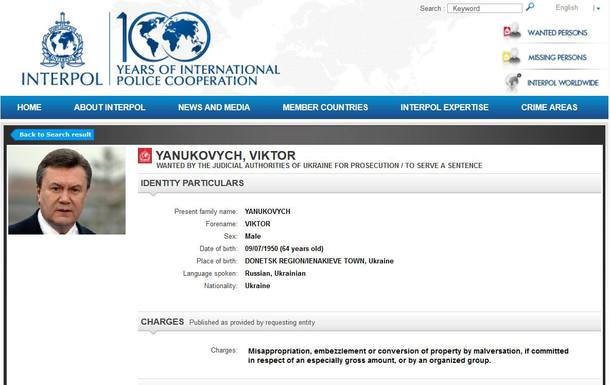
Germany has stressed that a summit will only take place if it leads to “concrete progress”.
A red notice for Viktor Yanukovych appeared on Interpol’s website on January 12. Under a red notice, Interpol’s role is described as assisting a national police force in “identifying and locating these persons with a view to their arrest and extradition or similar lawful action”.
Viktor Yanukovych, 64, was last seen in a photograph with film director Oliver Stone, which was said to have been taken in Moscow in December.
An unconfirmed report by Interfax news agency said Russia was likely to decline a request for Viktor Yanukovych’s extradition.
The decision to issue the notice was taken by a special Interpol commission, according to Ukrainian Interior Minister Arsen Avakov, after months of reasoning from the authorities in Kiev.
Similar red notices were also issued for ex-PM Mykola Azarov and Iurii Kolobov, a former finance minister, as well as Georgii Dzekon, ex-chairman of Ukrtelecom.
Arsen Avakov said a warrant had been issued for Viktor Yanukovych’s son Olexander, although that could not be confirmed on the Interpol website.
Ukraine’s new government accuses Viktor Yanukovych of ordering snipers to fire on protesters, although he rejects the accusations against him.
[youtube MFS9HQFIwVI 650]
Ukraine reports claim that a radioactive leak has been detected at Zaporozhye Nuclear Power Plant, the largest in Europe.
Levels of radiation are 16.8 times the legally permitted norm media report says, citing the country’s emergency services.
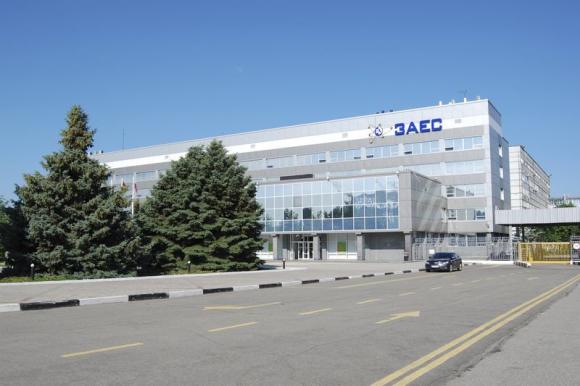
Photo Reuters
LifeNews.ru published a leaked report by the State Emergency Service of Ukraine, which denies an earlier assessment by the plant’s authorities that the radiation at the facility is equal to the natural background following an incident on December 28.
[youtube OfvLZW3N9R8 650]
Ukraine will abandon its non-aligned status and work towards NATO membership after a vote in the country’s parliament.
Russian Foreign Minister Sergei Lavrov called the move “counterproductive” and said it would boost tensions.
It is not clear when Ukraine will apply for NATO membership and many officials see it as a distant prospect.
Ukraine’s President Petro Poroshenko pledged to seek NATO membership over Russian support for rebels in the east.
Russia, which annexed the Crimean peninsula in March, denies supplying the rebels with weapons. However, it is subject to EU and US sanctions over the crisis.
In a vote in Ukraine’s parliament on December 23, lawmakers overwhelmingly backed the move by 303 to eight.
Speaking before the vote, Foreign Minister Pavlo Klimkin said Ukraine was determined to pivot towards Europe and the West.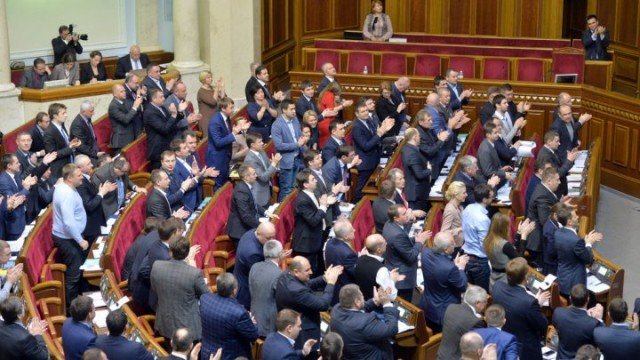
“This will lead to integration in the European and the Euro-Atlantic space,” he said.
The non-aligned status, which Ukraine adopted in 2010 under Russian pressure, prevents states from joining military alliances.
Addressing foreign ambassadors on Monday night, President Petro Poroshenko said Ukraine’s “fight for its independence, territorial integrity and sovereignty has turned into a decisive factor in our relations with the world”.
Russia has made clear that it opposes Ukraine’s move towards NATO.
Andrei Kelin, Russia’s envoy to the Organization for Security and Co-operation in Europe (OSCE), said on Tuesday: “It’s an unfriendly step towards us. This political vector will only add to nuisances and acuteness in ties.”
In a Facebook post on Monday, Russian PM Dmitry Medvedev warned that Ukraine’s rejection of neutrality would have “negative consequences”.
“In essence, an application for NATO membership will turn Ukraine into a potential military opponent for Russia,” he wrote.
A NATO spokesman in Brussels said on December 23 that any accession to the alliance would probably take years, Reuters reported.
[youtube N7rV_Wd8N3M 650]
The Moldovan pro-EU parties have a narrow lead over those backing closer ties with Russia, the latest results from the country’s parliamentary elections show.
With 89% of the votes counted, the three pro-Western parties have about 44%. The opposition has 39%.
No party appears to be able to form a government, and tough post-election bargaining is predicted.
The elections have taken on a wider significance in the shadow of the conflict in neighboring Ukraine.
Moldova and Ukraine have signed far-reaching partnership agreements with the EU, bitterly opposed by Russia.
On the eve of the vote, one pro-Russian party was banned from Sunday’s poll – a move criticized by Russia.
Residents of the Russian-backed breakaway region of Trans-Dniester did not take part in the election.
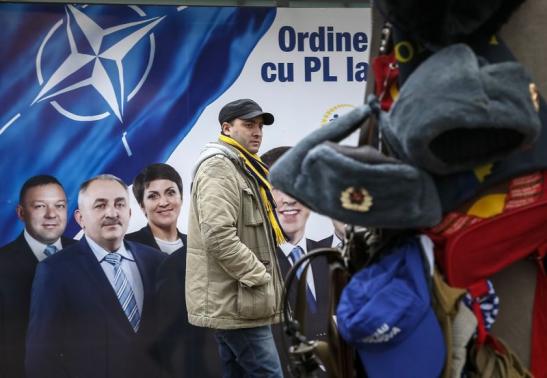
Photo Reuters
According to latest results, the three pro-European parties are set to have 57-58 seats in Moldova’s 101-seat parliament, while the two pro-Russian opposition parties are expected to hold 43-44 seats, reports say.
The pro-Russian Socialist Party led with more than 21% of the vote. The Communist Party was in third with almost 18%. The party is a Soviet-era survivor that still uses the hammer and sickle as its symbol, although it is not seen as fundamentally opposed to EU integration.
The pro-EU Liberal Democrats are in second place with 19%. The party wants Moldova to achieve EU candidate status by 2017 and full membership by 2020. Two other pro-Europe parties – the Democrats and the Liberals – are on just under 16% and 9% respectively.
There have been reports that the pro-EU parties may now try to form a “grand coalition” with the communists to keep the country on the European track.
Ahead of the Moldova vote, analysts said poll ratings of the Socialists, who want Moldova to turn its back on the EU and join a Russia-dominated economic bloc, had been boosted by their populist campaigning, including concerts by Russian pop stars.
Turnout was just under 56%, the central electoral commission said, out of a total of 2.7 million eligible voters.
Parties need to get at least 6% of the vote to gain seats in parliament.
[youtube UaNWns_mNHM 650]
People in Moldova are heading to polls to vote in parliamentary elections which are widely seen as a contest between pro-EU parties and those backing closer ties with Russia.
Recent opinion polls gave a lead to the pro-Westerners, but tough post-election bargaining is predicted.
On the eve of the vote, one pro-Russian party was banned from the poll – a move criticized by Moscow.
The elections have taken on a wider significance in the shadow of the bloody crisis in neighboring Ukraine.
The crisis began last November after Ukraine’s former leadership made a last-minute U-turn, refusing to sign a landmark association and free trade deal with the EU – under huge pressure from Russia.
This triggered mass protests in Ukraine that ousted President Viktor Yanukovych, and Kiev later signed the EU deal. But the protests, in turn, led to Russia annexing southern Crimea peninsula in March and throwing support behind separatist rebels in eastern Ukraine.
Moldova – which also signed the EU agreement – has been under growing Russian pressure to change course.
About 2.7 million people are eligible to cast their ballots, electing a single-chamber 101-seat parliament by a system of proportional representation.
However, residents of the Russian-backed breakaway region of Trans-Dniester are not taking part in the election.
Moldovan PM Iurie Leanca’s Liberal Democratic Party wants the country to achieve EU candidate status by 2017 and full membership by 2020.
Its coalition partner, the Democratic Party, is more moderately pro-European.
The most strongly pro-EU and pro-NATO party, the Liberals, left the ruling coalition and went into opposition last year.
The opinion polls predict that the three pro-Western parties may get up to 43% of the vote.
The main opposition party is the Communist Party – a Soviet-era survivor that still uses the hammer and sickle as its symbol.
Poll ratings of another pro-Russian party – the Socialists – have been recently boosted by its populist campaigning, including concerts by Russian pop stars.
Pro-Moscow forces are also expected to pick additional votes after the ban of the Fatherland party. It was barred from the elections on the grounds that it illegally received foreign funding.
The party – whose leader has fled to Russia – denies the claim.
The opposition also hopes to capitalize on the growing economic problems under the pro-Western government in Moldova – one of Europe’s poorest countries.
The situation worsened after a Russian ban on Moldova’s import of agricultural products – including wine, meat, fruit and vegetables.
[youtube mmL_FfOuEe4 650]
The removal of MH17 flight wreckage has begun at the crash site in rebel-held eastern Ukraine, Dutch officials say.
The Malaysian Airlines plane, which was flying from Amsterdam to Kuala Lumpur, was shot down over Ukraine in July. All 298 people on board were killed.
Debris will be transported to the Netherlands for investigation, the Dutch Safety Board said.
Access to the site has previously been limited by the rebels, and the ongoing conflict in Ukraine.
The recovery operation was expected to take several days, the Dutch Safety Board said.
MH17 wreckage would assist “the investigation into the cause of the crash”, it said in a statement, adding that it intended to reconstruct a section of the aircraft.
Russia rejected reports that President Vladimir Putin is allegedly leaving urgently the ongoing G20 summit in Brisbane, Australia, over the pressure on him due to the situation in Ukraine.
Russian presidential spokesman Dmitry Peskov said: “This is full nonsense.”
“Negotiators are raising this issue constantly.
“This is an ordinary routine situation,” he added.
Several media reported earlier that Vladimir Putin planned to leave the G20 summit before its end over the pressure exerted on him over the situation around Ukraine.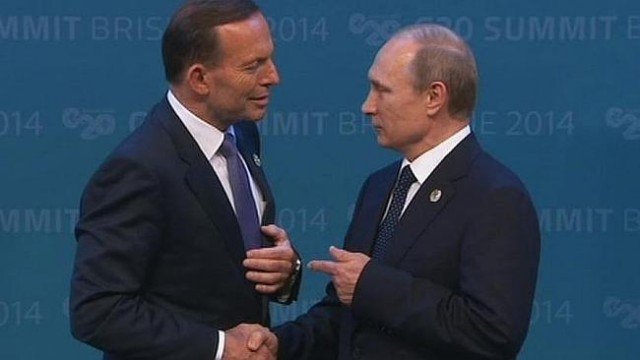
Russia has been rebuked by Western leaders about its role in the Ukraine crisis, at a G20 summit in Australia.
Canadian PM Stephen Harper told President Vladimir Putin that he needed to “get out of Ukraine”.
President Barack Obama said Moscow’s “aggression” in Ukraine was a “threat to the world”, while the UK threatened more sanctions unless Russia stopped “destabilizing” its neighbor.
The two-day summit in Brisbane is focusing on promoting economic growth.
World leaders are expected to elaborate on plans agreed by G20 finance ministers in February to boost global growth by 2% in five years.
However, November 15 – the first of the two-day summit – was dominated by Ukraine, where pro-Russian separatists have been fighting government forces in eastern regions.
Ukraine and its Western allies have accused Russia of sending military forces across the border, something the Kremlin denies.
The EU imposed sanctions when Russia annexed Crimea in March and has added further measures since.
[youtube jiUr4D1hjXs 650]
Russian military equipment and combat troops entered Ukraine this week, NATO top commander has said.
“Russian tanks, Russian artillery, Russian air defense systems and Russian combat troops” were sighted, General Philip Breedlove said.
Russia’s defense ministry denied that its troops were in eastern Ukraine to help pro-Russian separatists there.
However, the rebels have admitted being helped by “volunteers” from Russia.
The UN Security Council is convening an emergency session later on November 12 to discuss the reported sightings.
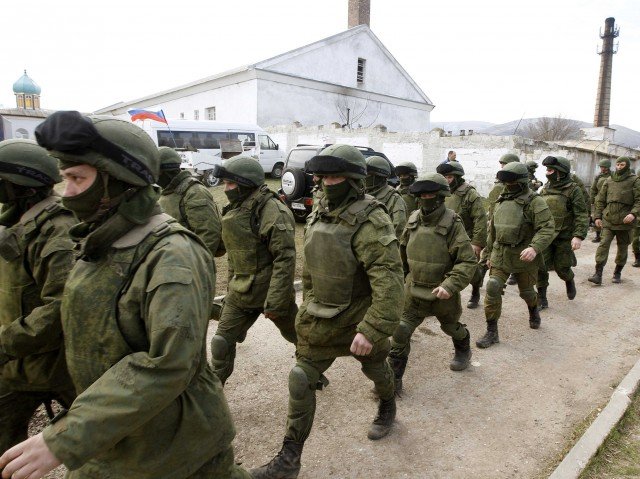
Russian military equipment and combat troops entered Ukraine
Heavy artillery fire rocked the east Ukrainian city of Donetsk, the industrial hub held by pro-Russian separatist rebels, on Wednesday morning.
It was unclear whether the fire came from besieging government forces or the rebels themselves, or both.
There were also reports of fighting near the rebel-held city of Luhansk. One Ukrainian soldier was killed and another injured north of Luhansk, when rebels fired on government positions near the village of Schastya, Ukrainian security forces said.
Back in August, NATO was warning about the deployment of Russian artillery batteries inside Ukraine, the supply of Russian military equipment to the rebel forces and the build-up of further Russian combat units at the Ukrainian frontier.
Since then many of these units have been withdrawn.
Now with tensions renewed, Nato’s Supreme Commander in Europe General Philip Breedlove has confirmed that over the past two days, NATO has seen columns of Russian armor, artillery and crucially – combat troops – entering Ukraine.
The question now is whether this is just a re-run of events in the summer or does a more significant clash beckon, perhaps one where the Kremlin may decide – in its terms – to teach the Ukrainians a military lesson.
Gen. Philip Breedlove also confirmed that NATO believes Russia is deploying nuclear-capable weapons to Crimea – a reference to reports that Russia is deploying short-range Iskander ballistic missiles there that could potentially be equipped with nuclear warheads.
One of the 298 people killed in the downing of Malaysia Airlines flight MH17 over eastern Ukraine was found wearing an oxygen mask, Dutch Foreign Minister Frans Timmermans has said.
Frans Timmermans indicated that not everybody on board had died instantly when the plane was hit by a missile.
According to an initial report, flight MH17 broke up in mid-air after being pierced by objects at high velocity.
Frans Timmermans has now said he regrets the remark and upsetting families.
“The last thing I want is to add to their suffering in any way,” he said in a government statement released hours after he made the comment on the Pauw talk show on Dutch TV.
“I shouldn’t have said it.”
The Dutch public prosecutor has confirmed that an oxygen mask was found, although a spokesman said it was around the passenger’s neck rather than their mouth. It has been secured with elastic and tested for DNA and fingerprints.
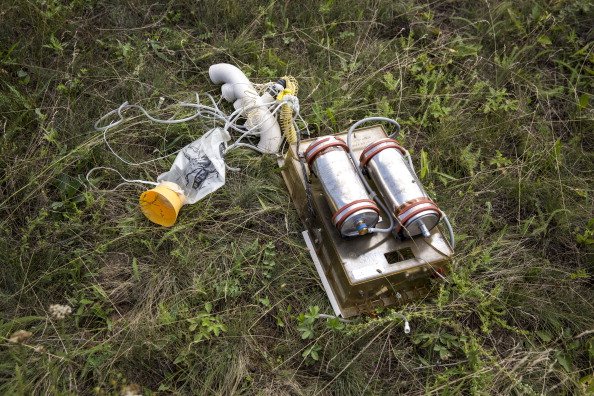
One of the 298 people killed in the downing of Malaysia Airlines flight MH17 over eastern Ukraine was found wearing an oxygen mask (photo Getty Images)
The plane had been flying from Amsterdam to Kuala Lumpur on July 17 when it went down over rebel-held territory. Pro-Russian separatist leaders deny shooting it down with a missile.
Although 196 of the passengers were Dutch, the passenger with the oxygen mask was not, the prosecutor said on October 9. Dutch media said the victim in question was an Australian and the family had been informed about the development.
None of the other victims was wearing an oxygen mask, the public prosecutor added. The mask was from a Boeing 777 plane, but it was unknown how and when it had been put on.
Frans Timmermans is seen as one of the big hitters in the Dutch government.
He is due to leave his post shortly as foreign minister to take up a post as European Commission President Jean-Claude Juncker’s right-hand man.
He mentioned the oxygen mask during an interview with Jeroen Pauw, in which he was taken to task for an emotive speech he gave to the UN four days after flight MH17 was downed on July 17.
In his address to the Security Council, Frans Timmermans imagined the horror felt by the passengers “when they knew the plane was going down” and wondered whether they had looked each other in the eyes “one final time, in an unarticulated goodbye”.
He acknowledged that those on board would not have seen the missile hit the plane.
“But do you know that someone was found with an oxygen mask on their mouth – and so they had the time to put it on?” Frans Timmermans said.
He went on to say that nothing could be ruled out about the 298 victims’ final moments.
The official inquiry into the MH17 disaster had not made any mention of an oxygen mask being found on one of the victims.
However, several experts concluded that the plane would have disintegrated too quickly for the passengers to have known anything about it.
Victims’ families, angry that they had not been told about the oxygen mask before, were told by prosecutors that an inquiry was still being carried out and no conclusions had been drawn.
Although investigators were unable to visit the crash site because of fighting in the area, their initial report pieced together photographic evidence of the wreckage as well as cockpit and air traffic control data.
They said it pointed to “an in-flight break up” and added there was “no evidence of technical or human error”.
Malaysia Airlines plane was hit while flying at 33,000ft (10,000m) and debris was found over a wide area of eastern Ukrainian territory held by pro-Russian rebels.
[youtube GGRjHRVSDdM 650]
A Ukrainian brand of toilet paper is causing a stir in Crimea because its name has the same initials as Russian President Vladimir Putin.
The V.V. brand toilet paper has been criticized by customers in Simferopol because it alludes to “Vladimir Vladimirovich”, the first two names of Russian President Putin, Radio Free Europe (RFE) says.
Russia caused international anger earlier this year by annexing Crimea after Ukraine’s pro-Russian President Viktor Yanukovych was ousted from power.
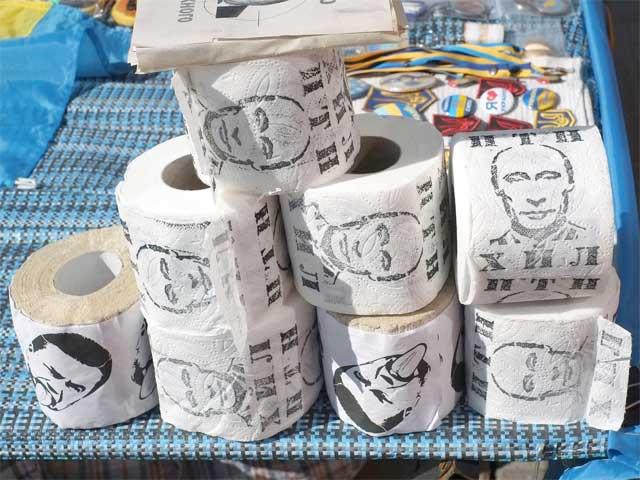
Toilet paper printed with the picture of Vladimir Putin are a popular novelty in Ukraine
Crimea’s Russian majority are fiercely loyal to Moscow, and customers found the perceived link to Vladimir Putin’s name difficult to take, RFE reported.
The Sevastopol News newspaper said that one user was “outraged” at the fact that the maker of the product – the Simferopol Paper Mill – had included an outline of the Crimean peninsula on the roll, the implication being that the map would be put to a potentially disrespectful purpose. However, the toilet roll may just be the result of local patriotism – the packing also says “Buy Crimean!” in large letters.
Toilet paper printed with the picture of Vladimir Putin are a popular novelty in Ukraine.
Seven Ukrainian troops are said to have died in a clash with pro-Russian rebels near Donetsk airport.
The attack is the deadliest single incident for the military since a truce deal.
A tank shell hit the vehicle carrying the troops, an official said.
Three civilians were reportedly killed in other incidents.
Ukrainian activists earlier toppled a statue of Lenin in the eastern city of Kharkiv – a move likely to be seen as a provocation by pro-Russians.
Nationalist protesters had gathered around the statue on Sunday night for a “Kharkiv is Ukraine” rally. The governor of Kharkiv region, Ihor Baluta, then signed an order to dismantle the statue.
The mayor of Kharkiv, Gennady Kernes, said on a local government website that the monument would be restored, calling its destruction unlawful.
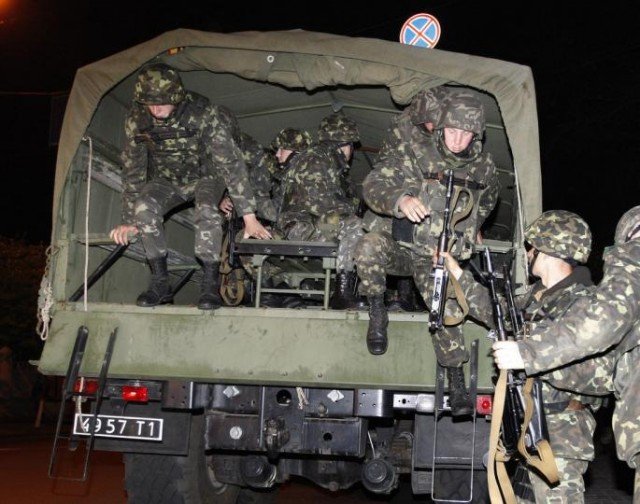
Seven Ukrainian troops are said to have died in a clash with pro-Russian rebels near Donetsk airport
Pro-Russian demonstrators defended the statue in February, as similar monuments were being taken down in other parts of the country in a wave of protests that accompanied the removal of President Viktor Yanukovych.
Kharkiv has largely escaped the violence which subsequently swept through east Ukraine’s other regions, Donetsk and Luhansk.
The latest deaths cast fresh doubt on a ceasefire agreed between the Ukrainian government and the rebels on September 5.
The seven soldiers were killed in a vehicle near Donetsk airport, which the rebels have been trying to capture from the Ukrainian military.
“During the evening attack, the Ukrainian armoured transporter, with its crew and a paratroop unit, took a direct hit from a tank,” Ukrainian military spokesman Col Andriy Lysenko told reporters.
He said a total of nine soldiers had been killed and 27 wounded in the past 24 hours.
Separately, authorities in Donetsk told AFP news agency that three civilians had been killed over the same period. The city is a base for the pro-Russian rebels.
The OSCE, which is monitoring the ceasefire, confirmed there had been heavy shelling around Donetsk airport.
For several days Russian state television has reported on “mass graves” allegedly unearthed by rebels near Nizhnya Krynka, a village near Donetsk. At least four bodies have been found there, according to the Russian reports.
[youtube U8hfVqPM1V4 650]
Ukrainian nationalists have torn down a statue of Lenin in the centre of Kharkiv, the country’s second-largest city, in a move supported by officials.
People cheered and leapt for joy as the statue came crashing down.
Pro-Russian demonstrators in the largely Russian-speaking city defended the statue in February, when President Viktor Yanukovych was ousted.
Kharkiv escaped the violent unrest which swept through east Ukraine’s other regions, Donetsk and Luhansk.
A fragile cease-fire has been in place for weeks between pro-Russian separatists in those two regions.

Ukrainian nationalists have torn down Lenin statue in the centre of Kharkiv
On Sunday night, when nationalist protesters had already gathered around the statue for a “Kharkiv is Ukraine” rally, the governor of Kharkiv region, Ihor Baluta, signed an order to dismantle the statue.
Some correspondents say the order was probably a last-minute face-saving move.
Ukrainian Interior Minister Arsen Avakov wrote on Facebook that he had given orders for police to ensure only the safety of people, “not the idol”.
“Lenin? Let him fall…” he wrote.
“As long as people don’t get hurt. As long as this bloody communist idol does not take more victims with it when it goes.”
However, Ukrainian media reported that police had begun an investigation into “vandalism”.
One protester was reportedly injured in the head as Lenin statue was dismantled.
[youtube lXLCR0cmDuU 650]
Hungary’s gas pipeline operator has suspended delivery of gas to Ukraine “indefinitely”.
Ukraine has been receiving gas from Hungary, Poland and Slovakia since Russia cut off supplies to Ukraine in June in a dispute over unpaid bills.
Ukraine’s state-owned gas firm, Naftogaz, confirmed the stoppage. It called the move “unexpected and unexplained”.
The pipeline operator, FGSZ, said it cut deliveries to Ukraine to raise the flow of gas to Hungary.
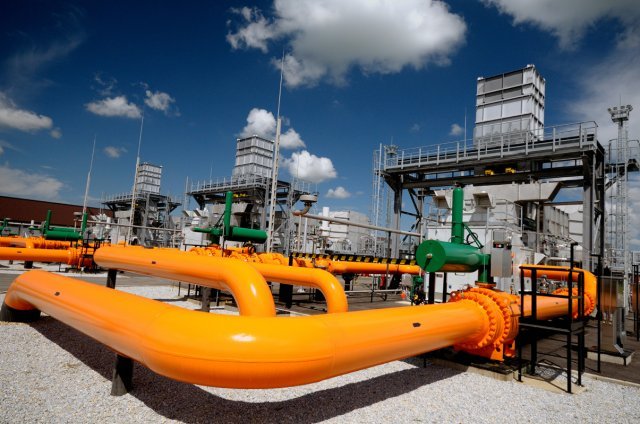
Hungary’s gas pipeline operator has suspended delivery of gas to Ukraine indefinitely
With winter approaching fears are mounting that Ukraine will be unable to heat homes and power industry without Russian gas.
On September 26, Russian and Ukrainian energy ministers are meeting in Berlin for European Union brokered talks, aimed at heading off such a crisis.
Hungary said the stoppage late on Thursday was for technical reasons and because it expected Hungarian demand for gas imports to increase.
It comes three days after a meeting in Budapest between the head of Russian gas giant, Gazprom and Hungary’s PM Viktor Orban.
PM Viktor Orban has been critical of EU sanctions on Russia and has maintained a closer relationship with Moscow than his western European neighbors.
Earlier this year Gazprom and Russian President Vladimir Putin warned of consequences if EU member states went ahead with deliveries to Ukraine.
Ukraine has announced its withdrawal from next year’s Eurovision Song Contest due to limited finances.
“We don’t want to do something badly, and we don’t have the money to do something well,” said Zurab Alasania, of the state broadcaster NTU.
Zurab Alasania said the broadcaster had to “optimize” its funds given the unstable financial and political situation caused by the conflict in east Ukraine.
Ukraine came sixth at the event this year in Copenhagen.

The 2015 Eurovision contest will be held in May in Vienna
The NTU (National Television Company of Ukraine) said it was focusing funds on creating public service broadcasting.
A statement said it had made a deal with the European Broadcasting Union (EBU) to exit the competition for the coming year, with a view to returning in 2016.
The 2015 contest is being held in May in Vienna, following the triumph of Austria’s Conchita Wurst at the event earlier this year.
The Denmark contest was overshadowed by the ongoing crisis in Ukraine, with Russia’s entry – The Tolmachevy Sisters – being booed by sections of the audience during the results.
Russia ended the night in seventh place with 89 points, behind Ukraine’s entry – singer Mariya Yaremchuk – with 113.
Ukrainian singer Ruslana won the event in 2004 and has subsequently become one of the leading voices of protest in opposition to Russia’s influence in her country.
Ukraine’s President Petro Poroshenko begins a key visit to the US to seek further support to tackle what he describes as Russian aggression.
Petro Poroshenko will hold talks with President Barack Obama before addressing a joint session of Congress.
He is flying to the US from Canada, where he told lawmakers Ukraine had bid “the last farewell” to the USSR after signing an EU association deal.
Ukraine accuses Russia of supporting rebels in its east. Moscow denies this.
More than 3,000 people have died in fighting between Ukrainian government forces and pro-Russian rebels in the eastern Donetsk and Luhansk regions since April.
A fragile cease-fire agreed on September 5 is holding, despite accusations of shelling by both sides.
The unrest in the east followed Russia’s annexation of Ukraine’s southern Crimea peninsula in March.

Petro Poroshenko will hold talks with President Barack Obama before addressing a joint session of Congress (photo Reuters)
In Washington, Petro Poroshenko will also give a speech at the influential Atlantic Council think-tank.
During the state visit he is expected to push for closer political and economic ties between his former Soviet republic and the West, and seek further financial support for Ukraine’s struggling economy.
Petro Poroshenko has also been pressing for military assistance from the US to help defend Ukraine.
President Barack Obama – alongside with many other Western leaders – has condemned Russia’s actions in Ukraine, but stressed that any military support would only include non-lethal equipment.
Both the US and the EU have recently imposed a new round of sanctions against Russia over its role in the Ukraine crisis.
Addressing the Canadian parliament on September 17, Petro Poroshenko said Ukraine had “crossed the Rubicon” by ratifying a day earlier the association and free trade agreement with the EU.
“This was Ukraine’s last ‘farewell’ to the Soviet Union,” he said to loud cheering and applause from Canadian lawmakers.
The association agreement aims to bring Ukraine closer to the EU and away from Russia’s sphere of influence.
The deal lies at the root of Ukraine’s crisis. It was former Ukrainian President Viktor Yanukovych’s refusal to sign it last November that triggered mass protests and his eventual fall from power.
[youtube m6D0-Kt49Ps 650]
An angry mob in Ukraine threw politician Vitaly Zhuravsky into a rubbish bin.
Vitaly Zhuravsky can been seen being jostled by the group in Kiev before being picked up and dropped in the metal container.
The mob is then seen throwing a tire and some liquid on top of him, pushing him back down roughly when he tries to get up.

Vitaly Zhuravsky is a former member of ousted President Viktor Yanukovych’s Party of the Regions
“Boys, let me kick him at least once,” a woman at the scene can be heard saying.
Vitaly Zhuravsky is a former member of ousted President Viktor Yanukovych’s Party of the Regions and was criticized in January for writing a bill aimed at suppressing anti-government protesters.
It is believed the mob was angered when Vitaly Zhuravsky and other politicians granted an amnesty to pro-Russia rebels.
[youtube RJR1wz7muFI 650]
About one million civil servants will be screened in Ukraine to root out corrupt practices from the past, PM Arseniy Yatseniuk has announced.
Ukraine’s parliament passed the lustration law on September 16, allowing the removal of government officials from their posts.
All those who worked under ousted President Viktor Yanukovych and also former senior Communist and KGB members will be affected.
Ukraine has had months of unrest since Viktor Yanukovych was ousted in February 2014.
Government troops had been fighting pro-Russia separatists in the eastern Donetsk and Luhansk regions for months, until a truce was signed on September 5.
Ukraine and the West accuse Russia of sending its troops and heavy weaponry to help the rebels – a claim denied by the Kremlin.
“About one million civil servants of different kinds will come under this law, including the whole cabinet of ministers, the interior ministry, the intelligence services, the prosecutor’s office,” Arseniy Yatseniuk said in a televised cabinet meeting.

Ukraine’s parliament passed the lustration law on September 16, allowing the removal of government officials from their posts (photo Reuters)
Correspondents say the issues of vetting and corruption are emotional subjects for many in Ukraine, who want to cleanse the government of Viktor Yanukovych’s influence.
The law on “lustration” – the cleansing of the ranks of power – was approved under huge pressure from activists, who took part in mass protests against Viktor Yanukovych.
The bill was finally passed after several failed attempts when speaker Okexandr Turchynov warned lawmakers he would not allow them to leave parliament without a successful result.
Outside the building, Vitaly Zhuravsky, who belongs to a party described as pro-Russian, was thrown by angry crowds into a rubbish bin.
The bill was approved on the same day as a new law granting self-rule to parts of the Donetsk and Luhansk regions.
It was part of the truce agreed between separatists and the Ukrainian government, although rebel leaders say they will continue to demand independence, and some Ukrainian lawmakers have described the move as “capitulation”.
At least 3,000 people have been killed in the conflict and more than 310,000 internally displaced in Ukraine, the UN says.
Also on September 16, the Ukrainian and European parliaments voted to ratify a major EU-Ukraine association agreement that aims to bring the ex-Soviet republic closer to the EU.
[youtube NPqDpvyn3dg 650]
Eastern Ukraine’s regions, which are controlled by pro-Russian rebels, have been granted self-ruled, as well as an amnesty for the fighters themselves.
The measures voted by Ukraine’s parliament are in line with the September 5 cease-fire agreement signed by President Petro Poroshenko.
The European and Ukrainian parliaments have also voted to ratify a major EU-Ukraine association agreement.
The rebels have been battling Ukrainian government forces since their seizure of eastern regions bordering Russia.
Ukraine and the West have accused Russia of backing the rebels with soldiers and heavy weapons. Russia denies doing so.
According to the UN, at least 3,000 people have been killed in the five-month conflict and more than 310,000 internally displaced in Ukraine.
The amnesty affects rebels in Donetsk and Luhansk regions, but does not cover the shooting down of the MH17 passenger plane in July.
Western leaders believe rebels shot down the Malaysia Airlines jet with a Russian missile – a charge the rebels and Russia deny.
Rebels accused of other “grave” crimes will not be covered by the new amnesty either.
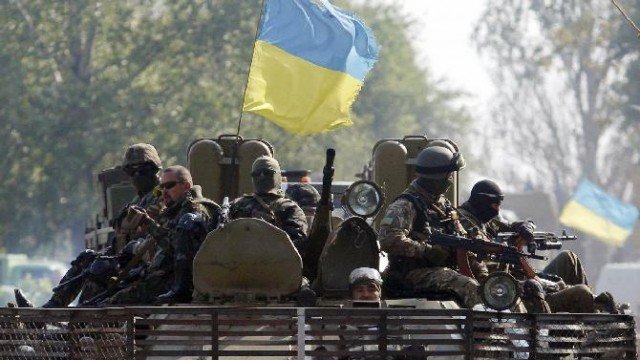
Eastern Ukraine’s regions, which are controlled by pro-Russian rebels, have been granted self-ruled, as well as an amnesty for the fighters themselves
The rebels have controlled most of Donetsk and Luhansk regions since April. They launched their uprising soon after Russia annexed Ukraine’s Crimea peninsula.
On September 16, there was heavy shelling around the government-held airport in Donetsk, despite a fragile cease-fire.
Meanwhile Russia is preparing to send extra troops to Crimea, Russian media reported.
They quoted Defense Minister Sergei Shoigu as saying that deploying “proper and self-sufficient forces” there was a top priority in light of the “presence of foreign military in the immediate vicinity of our borders”.
The EU-Ukraine agreement ratified on Tuesday lies at the root of Ukraine’s crisis.
It was President Viktor Yanukovych’s refusal to sign the deal in November last year that triggered mass protests and his eventual fall from power.
The votes ratifying the agreement took place simultaneously, with a live video link-up between the parliaments in Brussels and Kiev.
Both President Petro Poroshenko and the President of the European Parliament, Martin Schulz, called it a historic day.
However, negotiations with Russia last week led to the free-trade part of the agreement being postponed until 2016.
There are fears in Ukraine that Russia will still try to scupper the deal.
The amnesty law passed by the Ukrainian parliament means pro-Russian separatists taken prisoner in the fighting should now be released.
Rebels holding government buildings in the east are now supposed to leave them, hand over captured Ukrainian soldiers and other prisoners and surrender their weapons.
However, many of the rebels are demanding full independence, and speak of creating a new state called “Novorossiya”, something Russian President Vladimir Putin has also mentioned in speeches.
Andre Purgin, a rebel leader in the eastern city of Donetsk, told AFP news agency that the eastern region “no longer has anything to do with Ukraine”.
“Ukraine is free to adopt any law it wants,” he is quoted as saying.
“But we are not planning any federalism with Ukraine.”
Andre Purgin nonetheless said the legislation was a “positive signal because it marks Kiev’s return to reality”.
President Petro Poroshenko said the proposals would guarantee the “sovereignty, territorial integrity and independence” of Ukraine, while paving the way for decentralization.
Ukraine association agreement (officially called the AA/DCFTA) would make Ukraine compliant with EU standards in the areas of human rights, security and arms control, and would remove trade barriers.
The pact has been signed, but Russia opposes the free-trade provisions, saying its market could be flooded with cheap EU goods shipped via Ukraine.
Until 2016 Ukraine will maintain its existing restrictions on imports from the EU, while enjoying full access to the EU market for its own exports.
In return, Russia has pledged to maintain favorable trade rules in place for Ukraine as an ex-Soviet republic.
Yet the crisis has severely hit Russia-Ukraine trade ties, with the two neighbors imposing economic sanctions on each other.
[youtube qQVOufilgLc 650]
About 1,300 NATO troops from 15 countries have begun a military exercise near Lviv in western Ukraine.
The US says the drill had been planned before the current crisis in eastern Ukraine, where government forces have been battling pro-Russian rebels.
Clashes have continued in eastern Ukraine, particularly around the city of Donetsk, despite a ceasefire deal.
Russia denies sending troops to aid the rebels, as alleged by Ukraine and NATO.
Over the weekend, Ukrainian Defense Minister Valery Heletey said NATO countries had begun arming his nation in the fight against the rebels.
Valery Heletey did not specify the type of weapons being delivered or name the countries involved.
Several NATO members have denied similar statements made in the past.
Officials from the alliance say they have no plans to send lethal assistance to non-NATO member Ukraine – but member states are free to do so on a bilateral basis.
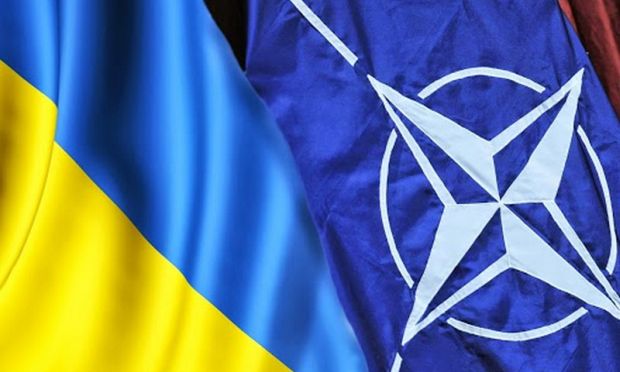
About 1,300 NATO troops from 15 countries have begun a military exercise near Lviv in western Ukraine
Some 200 US troops are taking part in the military exercise, codenamed Rapid Trident, near Lviv, on the Polish-Ukrainian border, some 600 miles) from the fighting in the east.
The exercise will bring together troops from several NATO member states and from former Soviet-bloc countries that are part of NATO’s Partnership for Peace program.
Pro-Russian rebels have been engaged in heavy fighting with government forces in the Donetsk and Luhansk regions since April. Some 2,600 people have been killed over the past five months of conflict.
Shelling was reported over the weekend around Donetsk’s government-held airport, with both sides accusing each other of endangering the truce.
Six people were killed and 15 hurt in the violence, Donetsk’s city council said.
NATO says Russia still has about 1,000 heavily armed troops in eastern Ukraine and about 20,000 more near the border.
Russia denies sending direct military help to the rebels, insisting that any Russian soldiers there are “volunteers”.
NATO has announced the formation of a new “spearhead” force numbering several thousand troops, which can be deployed to protect member countries in a matter of days.
It followed growing concern from NATO member countries bordering Russia over its involvement in Ukraine.
The EU will to impose further sanctions on Russia on September 12 over its role in the Ukraine crisis, diplomats say.
The move is aimed at maintaining pressure on Russia, the sources said.
Russia says it is preparing a response “commensurate with the economic losses” caused by the EU sanctions.
NATO says Russia still has about 1,000 heavily armed troops in eastern Ukraine – where pro-Russian rebels are fighting – and about 20,000 near the border.
The new sanctions are expected to tighten access to Western loans, especially for big Russian state oil companies, and expand a blacklist of Russian officials subject to visa bans and asset freezes. More rebel leaders will also go on that list.
Russian Foreign Ministry spokesman Alexander Lukashevich called the new sanctions “an absolutely unfriendly step”.
The EU decision followed a conference call involving a number of European leaders.
The member states struggled to agree on how to factor in the fragile truce between Ukrainian troops and pro-Russian rebels. It took effect on September 5 and appears to be holding despite some sporadic shooting.
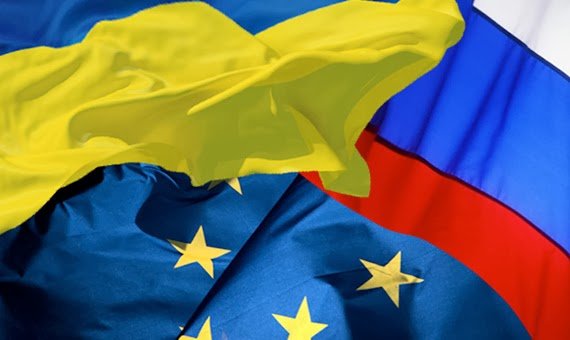
The EU will to impose further sanctions on Russia over its role in the Ukraine crisis
The rouble fell to a new low of 37.57 to the dollar on September 11, after news about the EU sanctions broke. It also fell against the euro.
Western leaders and Kiev accuse Russia of helping the separatists in eastern Ukraine with regular troops and sophisticated weapons including tanks. Moscow denies the allegations.
The separatists have recently made big gains in the eastern Donetsk and Luhansk regions. The fighting has killed at least 3,000 people since April.
At urgent talks among 28 member states in Brussels on Wednesday, Germany pressed for the sanctions to be put into effect.
Other countries said they wanted to wait while the cease-fire continued to hold.
The EU leaders agreed on Thursday that the sanctions should take effect “by the end of the week”, according to Reuters.
They will be published in the official journal of the EU, which puts them into effect.
The package was finalized on September 5, but its implementation was delayed because of the cease-fire agreed on the same day.
The new sanctions will target Russian oil companies Rosneft and Transneft and the petroleum unit of state gas monopoly Gazprom.
Their access to financial markets will be restricted – a serious matter for Rosneft, which last month asked the Russian government for a $42 billion loan.
The measures also cover dual-use goods which can be used for military purposes, defense equipment and some other sensitive technologies.
Russian PM Dmitry Medvedev has warned that Russia might shut its airspace to European passenger planes, a move that “could drive many struggling airlines into bankruptcy”.
[youtube gKe029zwgOo 650]
The European Union has formally adopted new sanctions on Russia over the Ukraine crisis.
The new measures include restrictions on large Russian state-owned oil companies raising money on European financial markets.
However, the new measures will come into effect “in the next few days”, not on September 9 as some had expected.
Russia denies accusations by Ukraine and the West that it has been sending troops to help pro-Russian rebels.
EU Council President Herman van Rompuy said the measures were aimed at “promoting a change of course in Russia’s actions destabilizing eastern Ukraine”.
The EU is being deliberately vague about when they will come into force, to allow time to assess the implementation of a cease-fire agreed on September 5.
“Depending on the situation on the ground, the EU stands ready to review the agreed sanctions in whole or in part,” Herman van Rompuy said.
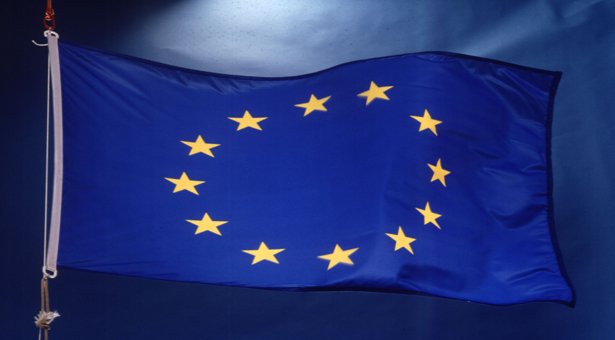
The new EU measures include restrictions on large Russian state-owned oil companies raising money on European financial markets
The cease-fire appears to be holding, although the head of the Organization for Security and Cooperation in Europe (OSCE), which brokered the deal, described it on September 8 as “shaky”.
Before the truce came into place, pro-Russian separatists made big gains in eastern Ukraine and seized territory a few miles outside the strategic south-eastern port city of Mariupol.
The gas sector is not affected by the latest sanctions. However, major state-owned oil firms are included, such as Rosneft, which is already targeted by US measures.
Russia has warned that it could block international flights through its airspace if the EU goes ahead with new measures.
Diplomats say the new package will target Russian oil companies Rosneft and Transneft and the petroleum unit of state gas monopoly Gazprom.
Their access to financial markets will be restricted – a serious matter for Rosneft, which last month asked the Russian government for a $42 billion loan.
Also on September 8, Ukrainian President Petro Poroshenko said that pro-Russian rebels in Ukraine have released 1,200 prisoners.
The releases followed the cease-fire deal, he said, which included an exchange of prisoners.
He was speaking during a visit to Mariupol, which has come under shelling from pro-Russian rebels in recent days.
Petro Poroshenko said during his visit on Monday that the city’s defenses would be reinforced and that rebels would suffer a “crushing defeat” if they advanced on the city.
Mariupol is the last city in Donetsk region still held by the Ukrainian government and is a strategic port on the route to Crimea, the peninsula annexed by Russia in March.
Fighting in eastern Ukraine has left some 2,600 people dead since April.
The sanctions would also expand the visa bans and asset freezes on Russian officials and entities, including separatist leaders in Ukraine.
Earlier Russian PM Dmitry Medvedev warned that Moscow would respond “asymmetrically” to further sanctions.
A Russian airspace ban “could drive many struggling airlines into bankruptcy”, Dmitry Medvedev told a Russian daily.
[youtube pre8toYzJiM 650]
France has decided to stop the delivery of the first of two Mistral navy assault ships to Russia over Ukraine crisis.
President Francois Hollande’s office blamed Moscow’s recent actions in Ukraine.
France had until now resisted pressure to halt the delivery.
It has said conditions are “not right” for delivery as it needed to respect an existing contract, to which EU sanctions could not apply retroactively, and that it would have been too costly to cancel.
The Vladivostok, the first of the two helicopter carriers, was expected to have been delivered to Russia by late October.
The second, the Sevastopol, was to have been sent next year, although no mention of it was made in Francois Hollande’s statement.
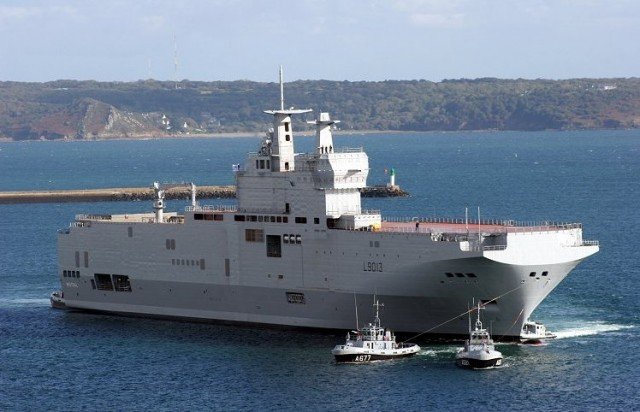
France has decided to stop the delivery of the first of two Mistral navy assault ships to Russia over Ukraine crisis (photo Wikipedia)
Francois Hollande’s office said today’s remarks by the Russian and Ukrainian presidents about a possible cease-fire were not enough to allow France to give it the go-ahead.
“The president of the republic has concluded that despite the prospect of ceasefire, which has yet to be confirmed and put in place, the conditions under which France could authorize the delivery of the first helicopter carrier are not in place,” it said in a statement.
Earlier on Wednesday, Ukrainian President Petro Poroshenko said he had agreed a “cease-fire process” with his Russian counterpart Vladimir Putin.
Vladimir Putin said he hoped a peace deal could be reached by Friday, when representatives of Russia, Ukraine and the rebels meet in Minsk for talks
The pro-Russian rebels have said they support Vladimir Putin’s proposals, but that they do not trust Petro Poroshenko to maintain a ceasefire.
It is not clear whether any truce is being observed on the ground.
Meanwhile, in Estonia, President Barack Obama sought to reassure the Baltic states that they would be protected by NATO, and said that Washington would stand by Ukraine.
Germany’s Foreign Minister Frank Steinmeier has warned that the crisis in eastern Ukraine is “slipping out of control” and needs to be reined in to avoid a military clash with Russia.
Frank Steinmeier made the remarks on the eve of an EU summit which will consider further sanctions against the Russian government.
Russia has denied claims by NATO that its forces illegally crossed into Ukraine to support separatists there.
Some 2,600 people have died in fighting between rebels and Ukrainian troops.
The conflict erupted in April when Russia’s annexation of Crimea prompted rebels to take control of large parts of the eastern regions of Donetsk and Luhansk.
Russian President Vladimir Putin has blamed Ukraine for the crisis, comparing its siege of Donetsk and Luhansk to the siege of Leningrad by Nazi Germany in World War Two.
Russia could face new restrictions after a summit of the European Union’s 28 heads of state in Brussels on Saturday.
The EU and the US have already imposed sanctions against dozens of senior Russian officials, separatist commanders and Russian firms accused of undermining Ukrainian sovereignty.
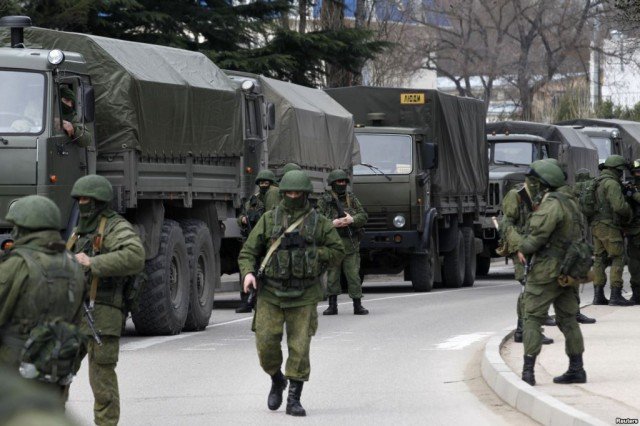
Russia has denied claims by NATO that its forces illegally crossed into Ukraine to support separatists there (photo Reuters)
In late July, the EU also blacklisted some key economic sectors, prompting Russia to retaliate by banning food imports.
Russia’s energy minister has warned that the Ukrainian crisis could lead to a disruption of gas supplies to European countries this winter.
Earlier on Friday, NATO held an emergency meeting after releasing satellite images it said showed columns of Russian armed forces inside Ukrainian territory.
NATO Secretary-General Anders Fogh Rasmussen called on Russia to “take immediate and verifiable steps towards de-escalation”.
Anders Fogh Rasmussen also indicated NATO could consider Ukraine’s application to join the alliance, shortly after PM Arseny Yatsenyuk announced he was putting Ukraine on course for NATO membership.
Meanwhile, heavy fighting has continued near the strategic port of Mariupol on the Azov Sea. Rebel forces are trying to capture the city but Ukrainian government troops are digging in.
On August 28, the separatists seized the nearby town of Novoazovsk.
The separatists’ advance toward Mariupol has raised fears that the Kremlin might seek to create a land corridor between Russia and Crimea.
Rebels are also reported to have surrounded government soldiers in several places further north, near Donetsk city.
[youtube tzfxkbGtCbY 650]
Between 3,000 and 4,000 Russian citizens are fighting in eastern Ukraine, a pro-Russian rebel leader in the area has said.
Alexander Zakharchenko, who is prime minister of the self-declared Donetsk People’s Republic, told Russian TV many of the Russians were former servicepeople or current personnel on leave.
He was speaking as rebels threatened to take the key port of Mariupol, after opening a new front in the south-east.
Reports say they have captured the town of Novoazovsk and are advancing on the port.
Ukraine says Russian forces have crossed the border and are supporting the rebel attack, but Moscow has repeatedly denied arming or covertly supporting the rebels.
There are suspicions that Russia wants to divert Ukrainian forces from the besieged cities of Donetsk and Luhansk, further north.
Government forces have made significant advances against the separatists in recent weeks.
German Chancellor Angela Merkel has demanded an explanation from Russia’s President Vladimir Putin amid the reports of an incursion.
French President Francois Hollande also said it would be “intolerable” if Russian troops were in Ukraine.
Alexander Zakharchenko said Russian citizens were coming to Ukraine to fight because they felt it was their duty.
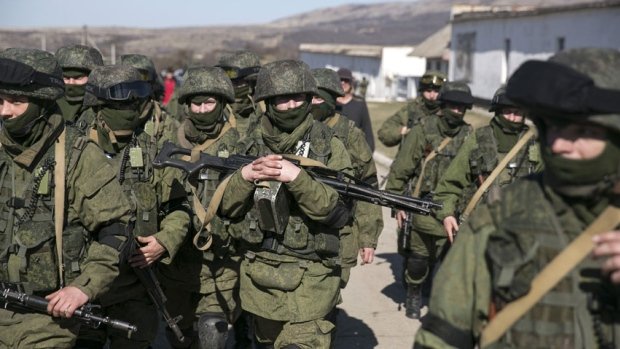
Between 3,000 and 4,000 Russian citizens are fighting in eastern Ukraine
“There have been around 3,000-4,000 of them in our ranks,” he said, adding that the rebels’ struggle would have been much harder without them.
He insisted that any Russians fighting on the rebel side were doing so voluntarily.
“Many former high-ranking military officers have volunteered to join us. They are fighting with us, considering that to be their duty,” he said.
“There are also many in the current Russian military that prefer to spend their leave among us, brothers who are fighting for their freedom, rather than on a beach.”
Reports from journalists and military on the ground say that Novoazovsk has been captured by the rebels.
A Ukrainian company commander, Vladimir Shilov, told Ukrainian TV that he had heard from sources inside the town that it was blocked by tanks and no-one was allowed to leave. Local officials had already fled to Mariupol, he added.
A spokesman for the rebels told Interfax news agency that Novoazovsk was under their control and they would soon “liberate” Mariupol.
Reports on Twitter suggested the rebels were already advancing towards Mariupol, and rebels said they had captured checkpoints to the west of the city.
The port has until now been peaceful and cut off from rebel positions.
Rebels have been trying for weeks to break out of an area further north in the Donetsk region where they are almost encircled.
Analysts say the separatists could also be seeking a land link between Russia and Crimea, which also would give them control over the entire Sea of Azov.
Russia annexed the Black Sea peninsula of Crimea from Ukraine in March.
In a phone call with Vladimir, Angela Merkel said reports of a Russian military incursion into Ukrainian territory had to be cleared up, her spokesman said.
The US also expressed its “deep concern” at the latest developments.
“These incursions indicate a Russian-directed counter-offensive is likely under way in Donetsk and Lugansk [Luhansk],” state department spokeswoman Jen Psaki told reporters on Wednesday.
“An increasing number of Russian troops are intervening directly in fighting on Ukrainian territory,” the US ambassador to Ukraine, Geoffrey Pyatt, wrote on Twitter.
Ukrainian President Petro Poroshenko promised a roadmap for peace in the east on Tuesday after holding his first direct talks on the crisis since June with Vladimir Putin.
Vladimir Putin said Russia would assist any ceasefire talks, but that stopping the fighting was a matter for Ukraine alone.
[youtube OSUeewx4qL8 650]
 Prev123...11Next
Prev123...11Next  Page 2 of 11
Page 2 of 11

























